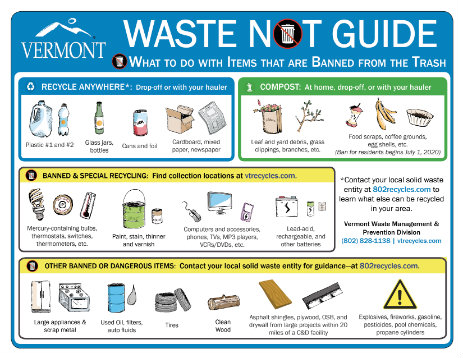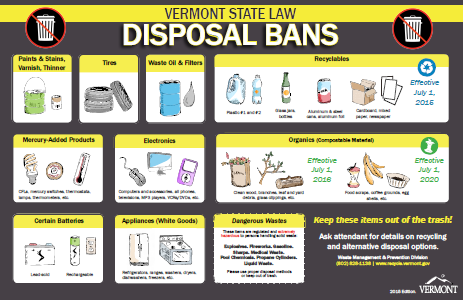The Vermont Waste Not Guide poster is available in: Arabic عربي, Bosnian Bɔ̌sanski, Burmese မြန်မာစာ, Chinese 普通话, Japanese 日本語, Kirundi, Nepali नेपाली, Russian Русский язык, Somali Soomaali, Español (Spanish), Swahili Kiswahili, and Vietnamese Tiếng Việt.
Items banned from disposal in the State of Vermont
According to Vermont State Law (10 V.S.A. § 6621a), no person shall knowingly dispose of any of the following materials in their household trash or in landfills:
- Lead-acid batteries (1990)
- Waste oil (1990)
- "White goods," or large appliances... (1991)
- Paint, oil-based and latex... (1991)
- Tires (1992)

- Mercury-added products (2007)
- Electronic devices... (2011)
- Mandated recyclables... (2015)
- Leaf and yard debris, clean wood (2016)
- Food residuals (2014-2020)
- All batteries (1992-2024)
Current Landfills Operating in State of Vermont
New England Waste Services Landfill | Coventry, Vermont
Permitted Acceptance Rate: 600,000 tons per year
Status: Operating
Find the location of a transfer station or drop-off center near you. Use the Materials Management Map.
What You Can Do to Keep Vermont Clean
- Do not burn trash. Do not dump trash in roadside ditches, swamps, abandoned quarries, or any open lands.
- Reduce, Reuse, Recycle
-
Reduce the amount of waste you create by buying products with less packaging and buying items that last longer instead of disposable ones.
-
Reuse the durable packaging you get (wash out that sour cream container and use it to put leftovers in).
-
Recycle all the materials you can, like cardboard, newspapers, cans and bottles. Learn more about how to recycle in Vermont.
-
- Take your trash to the transfer station or hire a pick-up service.
- Instead of burning or illegally dumping your trash, take it to your local transfer station. It only takes a few minutes to jump in your car or truck and haul it there, and it's much better for you and everyone around you. Or call a local solid waste hauler to provide pick-up from your curb!
- Instead of burning or illegally dumping your trash, take it to your local transfer station. It only takes a few minutes to jump in your car or truck and haul it there, and it's much better for you and everyone around you. Or call a local solid waste hauler to provide pick-up from your curb!
- Spread the word!
- You can make a difference by letting your friends and neighbors know about the dangers of burning trash and the safe alternatives.
-
The Vermont Waste Not Guide poster is available in: Arabic عربي, Bosnian Bɔ̌sanski, Burmese မြန်မာစာ, Chinese 普通话, Japanese 日本語, Kirundi, Nepali नेपाली, Russian Русский язык, Somali Soomaali, Español (Spanish), Swahili Kiswahili, and Vietnamese Tiếng Việt.

